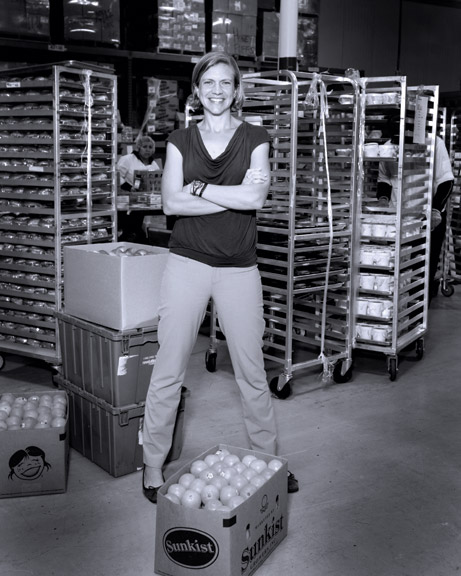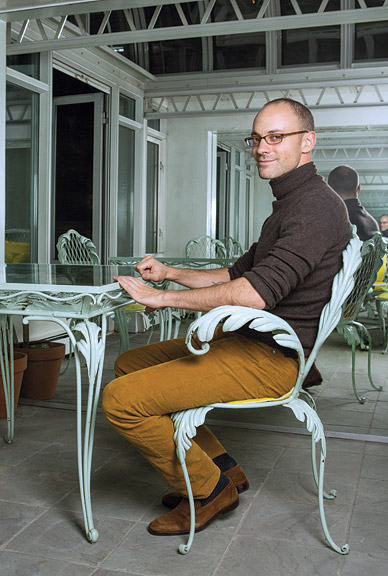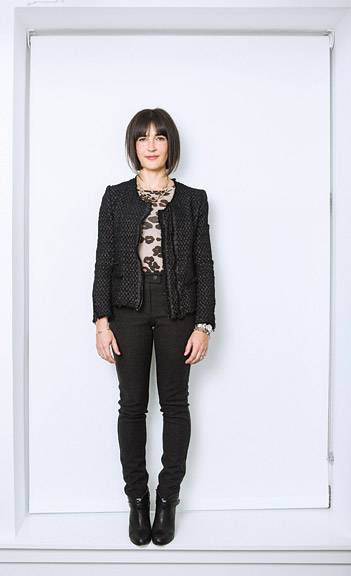You’ve heard the stories. Apple began when two college dropouts, Steve Jobs and Steve Wozniak, started fooling around with a microprocessor inside Jobs’s parents’ garage in Los Altos, California. Facebook was founded when Mark Zuckerberg and his college buddies created a website where Harvard students could learn more about one another.
Stories like these have fueled two generations’ dreams of what’s possible. Through good economic times and bad, the faith remains undiminished: that a young person’s passion and creativity could be harnessed into a company that is able to produce both profits and a better world. Whether or not Facebook and Apple have actually improved the lives of the world’s people, the mythology surrounding Jobs and Zuckerberg has probably convinced many people in their twenties and early thirties—and the venture capitalists behind them—that no idea is too outlandish to succeed in today’s constantly shifting zeitgeist. Or, as Erin Isakov ’00, the founder of the fashion label Erin Snow, puts it, “There’s no definition of what success is. You have to be courageous enough not to close yourself off—the key in life is to find your element, whatever it may be.”
Few of today’s young entrepreneurs seem daunted by the odds. According to the National Venture Capital Association, 25 to 30 percent of venture-backed businesses fail. A recent study by Harvard Business School found that 95 percent of start-ups fail to achieve either their projected revenue growth or their break-even point on cash flow.
Not surprisingly, many Brown students and alumni are undeterred. Take Eliot Horowitz ’03, for example, a cofounder in 2005 of ShopWiki, which helps consumers find the best prices for products online. As ShopWiki’s chief technology officer, Horowitz developed the web crawling and data extraction algorithms that were the foundation of ShopWiki’s success. Horowitz was so good at it that in 2006 BusinessWeek selected him as one of its Top 25 Entrepreneurs Under Age 25. Six years later, Oversee.net bought ShopWiki for an undisclosed sum, and Horowitz went on to cofound and become CTO of 10gen, a software-database company, which, as of last May, had raised $73 million in funding.
Yet
to say that young people are founding companies to become rich
oversimplifies their motivation. Some say they established a business
as an excuse for following a passion for music, or as a vehicle for
trying to promote a product or practice that they believe can help make
the world a fairer, more just place. Here are five promising start-ups
by recent graduates that are showing early signs of success. How long
any of them will last is impossible to say. After all, today’s global
economy is ruthlessly indifferent to noble intentions and young
people’s dreams. But the men and women behind these companies are proof
that, when it comes to translating a passion into concrete action,
Brown alums are showing no signs of slowing down.

Jobstr
It started in spring of 2011 with two friends asking some of life’s big questions. Frank Hajdu says that, by phone and e-mail and in restaurants around Manhattan, he and Dan Corbin chatted about “work, what we were doing with our lives, fulfillment, and happiness. These were some profound discussions.” Both men recently had quit successful, high-paying jobs, Hajdu as an executive at Myspace and Corbin as a corporate lawyer. They decided that whatever they did next, they’d do it together. And whatever they did, it would not be working, as Corbin puts it, at “these allegedly prestigious jobs, but feeling incredibly unfulfilled.”
Sometimes a business idea comes from noticing a need that’s evident right under your nose but that no one else sees or understands. Hajdu and Corbin had both gone to prestigious graduate schools, Hajdu in business, Corbin in law, and knew a slew of classmates who got well-paying, highly regarded jobs after graduating. But so many of them were unhappy in their jobs. “On paper it all looked great,” Hajdu says, “but such a vast majority of them weren’t happy.” According to Hajdu, Jobstr, the company he and Corbin would form, grew out of a desire to help all these people find more meaningful and enjoyable careers.
Jobstr is a website aimed at people who are looking for a new job but are not quite sure which one. At Jobstr, you can pose questions directly to people who work at an occupation about which you want to know more. Both you and the person you’re asking can choose to remain anonymous, and so the answers are more honest than you’d get at an informational interview or by chatting up someone at a cocktail party. “It’s a place where career explorers can get honest information,” Hajdu says.
The site went live last January. Among the people interviewed have been a school teacher, a physical therapist, an obstetrician-gynecologist, an investment banker, and a 2012 election inspector. “People would be surprised to know,” the inspector wrote, “that we don’t really care who you are voting for and by the time the polls close we just want to go home and sleep. I didn’t even watch the news to see who won. I figured I’d hear the next day.” Among the investment banker’s more candid answers were questions about the number of hours he logs at his job—sixty or more—and what lucrative perks he gets. “None of it,” he wrote, “can compensate for a complete lack of control over one’s schedule and the simple lack of personal time. Anyone who tells you otherwise is lying.”
Even for those not looking for a job, the site offers some voyeuristic thrills. A manager of a gentlemen’s club was asked whether he has ever had sex with the strippers. “The girls will offer you all kinds of things,” he replied. “However, they’re gonna want something in return.… It’s just gonna lead to a headache.” A bar mitzvah disc jockey was asked about the craziest thing he ever saw at a party. “The bat mitzvah girl with enough product in her hair to pollute an entire country stands too close to the bat mitzvah candles,” he wrote. “POOF!”
Reading Jobstr can quickly become addictive. Hajdu described the number of visitors to the site as “modest,” but said that users spend an average of forty-five minutes there over the course of a month. He says he gets calls from friends, telling him, “You son-of-a-bitch, you just cost me two hours at work.”
So far, Hajdu and Corbin are funding Jobstr with their personal savings. They say they may seek outside investors at some point, but “currently keep low overhead and likely won’t actively pursue investment until our scaling or expansion needs require it.” The company is not yet profitable, and, although the website now includes no advertising, selling space on the site is a possible future revenue stream. Hajdu and Corbin are also considering a subscription fee for users to access some sort of premium services, and they imagine possibly licensing their content to another site. A bigger site such as Monster.com, for example, might want to pay to offer some Jobstr content to complement its job listings. And, depending on how many secrets are revealed and how jobs are depicted, companies might even want to use the material for recruiting.
Right now, Hajdu and Corbin say the focus is on building a loyal
readership. In the meantime, they’ve gotten what they’ve always wanted:
a job they love. “It honest-to-God doesn’t feel like work,” says
Corbin. “I can’t wait to get up in the morning.”

Revolution Foods
If there’s one image from Brown that remains indelibly imprinted on Kirsten Saenz Tobey’s mind it’s of a child eating a cherry tomato. During the summer between her junior and senior years, Tobey ’00 worked at the Southside Community Land Trust, a nonprofit organization in South Providence that educates kids about gardening and sustainable agriculture.
“We were teaching them about where food comes from, how it’s grown, and getting them to taste new things,” she recalls. “I’d take them to a tomato garden and say, ‘Okay, pick one of these cherry tomatoes.’ A lot of them had never tasted one before. But once they tried one, they couldn’t get enough.”
In a sense, Toby has turned that summer experience into a full-time career. She is cofounder and chief innovation officer at Revolution Foods, an Oakland, California–based company that provides healthy meals to more than 1,000 schools across the country. The foods they serve contain no artificial ingredients, high-fructose corn syrup, or trans fats. They never serve French fries. A typical lunch might include buffalo chicken sandwiches with baby carrots and honey-roasted soy nuts, or pasta Alfredo with white beans and fresh butternut squash. Both lunches come with a side of fruit. “This is going to impact kids twenty, thirty years down the line in terms of their health and life expectancy,” Tobey says. “But we also see improved academic performance in the kids in the short term.”
The idea for Revolution Foods came to Tobey and her business partner, Kristin Groos Richmond, while they were MBA students at UC Berkeley and had to draw up a business plan for a new company. They soon realized that, for the food company they envisioned to be successful, it would have to overcome daunting logistics. They would need to build kitchens, hire chefs and nutritionists, and develop a distribution network, all just to get the food to the schools in time for breakfast. The meals would have to be dirt cheap, competitive with the roughly $2.75 per meal that the federal government currently reimburses the schools. And, even if they could do all that, they would still need to convince notoriously inflexible school bureaucracies that they needed to change their meal plans.
So Tobey and Richmond started small, with a four-month pilot program in an Oakland charter school. A local Whole Foods store agreed to provide ingredients. Tobey and Richmond woke up at 3 a.m. every day to deliver the meals themselves. In the end, the project was enough of a success that they decided to upgrade their operations.
The pilot, Tobey says, “generated a lot of momentum. It was like having
a prototype of a product. You all of a sudden have something you can
learn from and show others.” A month after they graduated from business
school in 2005, the two women opened their company.
“We got a lot of resistance from schools in the beginning,” Tobey says.
“We got a lot of people saying, ‘Oh, kids will never eat healthy food.
Kids like junk food. We feed them Tater Tots and pizza because that’s
what they like.’” But, as obesity and diabetes in kids gained more
national attention, schools grew more interested.
Today, Revolution Foods has kitchens and distribution centers in seven major cities—Oakland, Los Angeles, Denver, Houston, Newark, Washington, D.C., and New Orleans. The company is also now preparing to sell its products directly to consumers starting in July 2013. Revolution Foods is on target to gross nearly $70 million this year, though there will still need to be more growth before the company is profitable overall.
No matter. Tobey’s dream, she says, is “to impact every kid in the country.”

iASO Records
It’s 2001. You are riding on a New York subway when the doors open at a station in Manhattan and you hear the strains of unfamiliar music. This is not your stop, but you get off anyway. Up against a concrete pillar, you see an old man playing an acoustic guitar and singing in Spanish. You tell him how much you like his music. He explains that it’s bachata, a popular music and dance style from the Dominican Republic countryside. Heavily influenced by the Cuban bolero, its lyrics tell of lost love, heartbreak, and sadness.
You are still living in your parents’ apartment on the Upper East Side, but, what the hell, you invite the musician over. You have a computer and a microphone and want to record him singing. He agrees to come. He tells you his name is Super Uba, and though you don’t know it at the time, he is considered one of the greatest bachata players of all time. You make the recording. When he leaves, you agree to stay in touch.
As improbable as this story sounds, it is how Benjamin de Menil got started in the music industry. A year after meeting Super Uba, de Menil, who was still living with his parents, decided to put together a bachata album. To record Super Uba’s band at his parents’ apartment, de Menil had to split the members up among three rooms and a closet and run cables around the apartment so the musicians could hear one another on earphones. Over the course of several days, the band recorded ten songs, enough so that he could release an album under his own label, iASO Records, which describes itself as “a center for experiencing and learning about music…. Our motto is authenticity.”
And nothing happened. “I assumed the music was so great, it would sell on its own,” de Menil says. He tried the big labels, but they said that Super Uba couldn’t get a record deal until they played concert halls and built up a following. Concert halls said they wouldn’t let him play until he had a record deal. “I just kept at it,” de Menil says, “arranging all these small gigs around the city.” Sometimes he had to pay the venue to let the band perform. It still didn’t go anywhere. Salsa was all the rage, de Menil says: “People didn’t want anything to do with bachata.” Then, in early 2003, the Brooklyn Museum booked Super Uba for a concert. It “was our first big break,” de Menil says. The group started getting bookings from musical festivals across the country.
But this still was no way to make a living. De Menil was on the road all the time with the band and barely making enough money to get by. He got a job at Putumayo World Music, a record label that packages international music. Then, in 2004, he entered business school at Harvard.
After graduating, de Menil had his pick of jobs in the corporate world, but he just couldn’t get the beat of bachata out of his head. He went back to working for iASO Records. De Menil knew that Super Uba, who had been in the United States illegally, had since returned to the Dominican Republic, so he approached other bachata musicians, signing ten of them, including Joan Soriano, another major artist in the genre. So far, iASO has released nine albums, distributing them through iTunes and small, independent stores. De Menil has also partnered with a nonprofit organization in the Dominican Republic to preserve the bachata tradition.
The company now makes a modest profit, de Menil says. With the plunge in record sales industry-wide, most bands make their money from touring and peddling merchandise at concerts, where they can sell directly to the public. But even that source of income is threatened, mostly by illegal music downloads. Two years ago de Menil took one of his bands to France, expecting to sell CDs at the concert. Only one recording sold. “Everyone I spoke to said they already had the album, which I took to mean that everyone had downloaded it illegally or got it from a friend,” de Menil says. All the same, de Menil says several of the bands he represents are on the “cusp of where they can become very profitable.”
Now de Menil is turning to tourism, hoping to join with private tourist agencies and government tourist offices to promote his bands. Vacationers, he says, often want to hear traditional music when they visit a country, and music played at promotional events can entice tourists to visit. He also foresees working with such nonprofit entities as museums and universities, which, he says, “are often willing to take risks on new artists that the profit sector can’t.”
None of these options are likely to make anyone rich, but that was not
what drove de Menil to music in the first place. “I built this business
to pursue my passion for music,” he says. “My desire for profit comes
more from the need to make the business sustainable than as an end unto
itself.”

Erin Snow
Erin Hooks Isakov grew up on the slopes. Her father was a ski patroller in the 1970s, and her parents fell in love beneath the lifts at Mammoth Mountains in California. Isakov learned to ski when she was still a toddler. In her teens she took up snowboarding.
Now Isakov designs skiwear for her company, Erin Snow. At Brown, Isakov planned to become a human rights lawyer, concentrating in both public policy and philosophy. “I was on the path to law school,” she says, “and over the summer between my sophomore and junior year I said, ‘I want to do something fun this summer and take a break.’”
Isakov got an internship with the retail powerhouse Theory, which back then was still a fledgling clothing company owned partly by Elie Tahari, a major player in the fashion world. Since the company was tiny, Isakov says she could get experience in everything from design to sales to public relations. She returned the following summer and discovered she had an affinity for fashion.
Still, after graduating in 2000, she joined a San Francisco law firm and hated it. So she trashed her law school applications and called up Elie Tahari, who hired her immediately. A year and a half after graduation, Isakov was promoted to director of merchandising, and, soon after, she decided to start her own business.
For inspiration, she looked back to her teens. “When I started snowboarding there was a small amount of gear, but there certainly was not any apparel,” she says. “Skiing on the weekends while working in New York, I felt uncomfortable because the apparel was so out of touch with my personal style.” Isakov designed an entire collection, creating tailored pants and jackets that would perform both on the slopes and on the streets.
Isakov launched the line in 2004, and that fall Blooming-dale’s picked up her entire luxury line of high-performance stylish coats. Soon Erin Snow could barely keep up with demand for its products, especially the vintage-inspired stretch ski pants. Isakov decided to make the pants Erin Snow’s focus, and now offers seven versions in a rainbow of colors. All the company’s products are manufactured in North America.
On the way up to a Bloomingdale’s outside Boston that year, Isakov and her mother stopped in Providence for lunch. In the restaurant, Isakov spotted one of her public policy professors and felt a strange need to defend her unconventional success. Now, she says, “I’ve been really lucky. You can succeed in so many different ways, and there’s no definition of what success is. You have to be courageous enough not to close yourself off—the key in life is to find your element, whatever it may be.”

Takamoto Biogas
As Kyle Schutter ’10 and his roommate were riding back to Providence on the train from Boston one day during their senior year, they did what they often did during their discussions. “We’d just throw these crazy ideas at each other,” Schutter says. The crazy idea this time was biogas. “Have you ever heard of it?” his roommate asked. Schutter hadn’t. “You just take anything that can rot and turn it into fuel.”
After this, Schutter, a biomedical engineering major, couldn’t get biogas out of his head. For a class, he drew up a plan for a biogas company operating in the developing world. After graduation, he considering earning a PhD, but he changed his mind.
“I could get a PhD and know what I’ll be doing for the next seven years,” he thought, “or I could start this company, and I won’t even know what I’ll be doing a year from now.” Young and adventurous, he chose the second option.
After graduating, he went on a fact-finding trip to Africa and started an internship with a biogas construction company in Ghana. It didn’t work out. Schutter didn’t like his boss, and he was being given only menial tasks to do. After five days, he quit and went on his own to Uganda, Rwanda, and, finally, Kenya, which he decided “was a great place to live and start a business.” The country has a reliable cell phone network, he says, and an educated, business-oriented population. Farmers in rural areas—his target customers—have access to banking services. And finally, well ahead of the United States, Kenya has developed a mobile money system in which phones can be used to purchase goods. This makes handling cash unnecessary, which Schutter says reduces “the chances of theft and increases transparency.”
He opened Takamoto Biogas in Nairobi in 2011. He used a biogas system developed by a nonprofit company, taking cow dung, vegetable scraps, cooking grease, and even human feces—pretty much anything organic—mixing in water, and placing it in an oxygen-free container. Bacteria digest the waste, generating natural gas that can be captured and used to fuel anything from a milking machine to a propane cooking range. Over a six-month period, Schutter sold twelve biogas systems, each one costing $1,000.
Schutter turned to friends and family for additional capital, and during the next year and a half he sold twenty more units. If the cost of research and growth are excluded, he says, his company is already profitable.
Ever the engineer, several months ago Schutter began working in his backyard on a new model for the biogas system. He has now lowered the upfront cost to $100 and reduced installation time from twelve days to three hours. This winter he plans a renewed push to sell more units. He also will begin to court outside investors and apply for grants from foundations.
“Right now we are in a good place,” Schutter says. “We could grow faster if we had more cash, but we have to keep” enough cash on hand “because one of the biggest threats to an enterprise is stress and burnout.”
Government corruption can also be a hindrance. A Kenyan official once asked him for a $200 bribe in exchange for a permit. Schutter said he would sell the bureaucrat a biogas system at a reduced price: $1,000. The official didn’t know that what Schutter was charging him was the regular retail price for the system. The bluff worked, and no laws were broken.
For now, Schutter plans to concentrate on Kenya, but he eventually hopes to distribute his biogas systems throughout the developing world. Already, he’s received inquiries from officials in Cameroon, Somalia, and Uganda. “Whether it’s me or someone else,” he says, “this idea will be spread worldwide.”
Lawrence Goodman is the BAM senior editor. Alexa Trearchis is a BAM intern.
Photography by Dustin Fenstermacher




